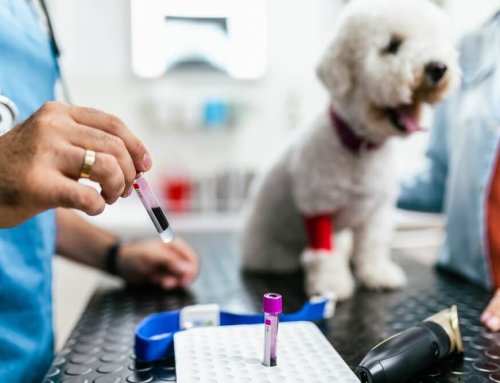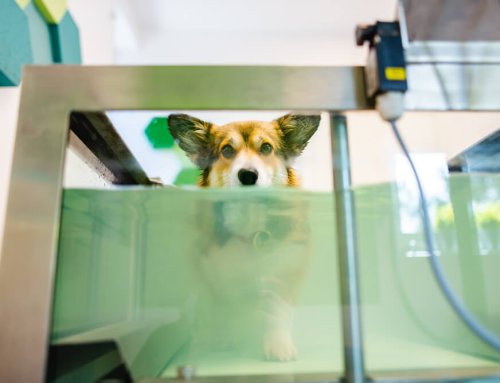Pets occasionally scratch an itch, but frequent or incessant scratching indicates a problem. Many issues can cause your pet to itch, and our 360 Pet Medical team provides information about pet itchiness causes and how we treat these conditions.
Pet itchiness causes
Numerous factors can cause pets to scratch incessantly. Some common causes of pet itchiness include:
- Flea allergy dermatitis (FAD) — Many pets are allergic to compounds in flea saliva, and one flea bite can result in a severe reaction. Affected pets typically lose hair and develop skin lesions in areas such as their lower back, tail head, groin region, and abdomen. Surprisingly, fleas aren’t often found on a pet with FAD, because the itchiness prompts them to groom constantly, removing the parasites.
- Environmental allergies — With environmental allergies (i.e., atopy), pets are allergic to allergens such as pollen, grasses, weeds, dust mites, and mold spores. Atopic pets’ skin barrier has a deficiency that allows allergens to penetrate, causing an inflammatory response. Pets between 1 and 3 years of age may show signs seasonally. Affected pets usually lose hair and develop skin lesions around their eyes, mouth, abdomen, armpits, limbs, paws, and under the tail. They also frequently have recurrent skin and ear infections.
- Food allergies — Some pets develop an allergy to ingredients in their food such as beef, chicken, dairy, eggs, soy, and wheat. Affected pets typically eat the problematic food for months or years before signs manifest. Affected dogs typically exhibit facial and anal itching, paw chewing, and recurrent ear infections. Affected cats typically lose hair and develop scabby skin lesions around their neck and head. Some pets may also exhibit gastrointestinal (GI) signs.
- Mites — Sarcoptes scabiei mites cause sarcoptic mange. Adult mites mate on a pet’s skin surface, and the female burrows into the skin to lay their eggs. Once the eggs hatch, the immature mites migrate to the skin surface to feed on skin cells. A compromised immune system may contribute to a pet’s susceptibility. Affected pets typically lose hair and develop thick crusted skin most notably on the ear margins, ankles, armpits, and elbows.
- Skin infection — Bacteria and yeast can cause skin infections, most commonly secondary to other skin conditions, causing or exacerbating itchiness.
Pet itchiness diagnosis
Because numerous issues can cause pet itchiness, determining the cause can be difficult. Potential diagnostics include:
- Physical examination — Our 360 Pet Medical team thoroughly examines your pet from nose to tail, noting where your four-legged friend is exhibiting skin lesions, hair loss, and excoriations.
- Flea comb — We use a flea comb to check your pet’s coat for fleas and flea dirt (i.e., flea excrement).
- Skin scrapings — Our team may perform a skin scraping and evaluate the sample under a microscope, which helps detect infection and mites.
- Blood work — We may recommend a complete blood count (CBC) and biochemistry profile to assess your pet’s overall health.
- Allergy testing — If we suspect your pet has environmental allergies, our team may suggest blood testing or intradermal skin testing to determine the allergens responsible for your pet’s reaction.
- Food trial — If our team suspects a food allergy, we may recommend a hypoallergenic food trial to determine the problematic ingredient.
- Culture — If we suspect a bacterial or fungal infection, our team may culture a sample to determine the causative pathogen.
Pet itchiness treatments

Your pet’s itchiness is treated based on their diagnosis, and a unique plan is tailored to address their specific condition. Potential strategies include:
- Flea control — If your pet has FAD, fleas must be completely eradicated from your pet and their environment. In addition, fleas exacerbate many other conditions, and you must ensure your pet receives year-round flea preventive medication to control these parasites. These products also typically kill sarcoptic mites.
- Bathing — To remove allergens from your pet’s skin and soothe their irritated, itchy skin, you should bathe your four-legged friend using a specially formulated shampoo. However, avoid bathing your pet too frequently because their skin can dry out, making them more itchy. Our 360 Pet Medical team will recommend your pet’s appropriate bathing schedule.
- Steroids — Steroids help reduce inflammation and itchiness, and we commonly recommend them to treat itchy pets. Because these drugs can cause serious side effects, our team prescribes them with caution and at their lowest effective dose.
- Anti-itch medications — Numerous anti-itch medications are available, and we prescribe the product that is best for your pet.
- Omega-3 fatty acids — Omega-3 fatty acids decrease skin inflammation and improve skin health. Administration is typically required for about six weeks before results are appreciated.
- Antihistamines — Although antihistamines aren’t as effective in pets as they are in humans, these medications can be helpful when used in conjunction with other treatment strategies.
- Hypoallergenic diets — If your pet has a food allergy, they must avoid eating the problematic ingredient, eating only food and treats that don’t don’t include the allergen, including medicated chews and vitamins.
- Hyposensitization therapy — Allergy shots are the gold standard for atopy treatment, which involves administering gradually increasing doses of the causative allergen to decrease your furry pal’s response. Allergy shots typically take about 6 to 12 months to become effective. About 70% of pets respond positively to hyposensitization treatment.
- Antimicrobials — If your pet has a skin infection, our team prescribes the appropriate antibiotic or antifungal medication.
Pet itchiness is a frustrating problem, but the appropriate diagnostics and treatment can help resolve the issue. If your pet has been scratching incessantly, contact our 360 Pet Medical team, so we can help alleviate your furry pal’s misery.








Leave A Comment